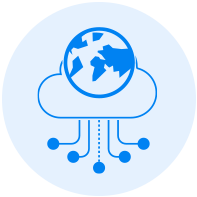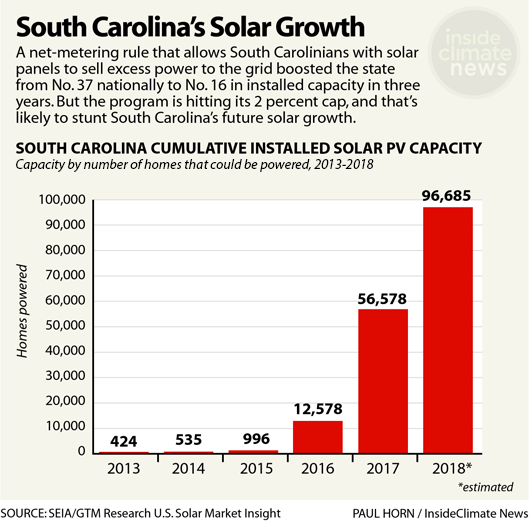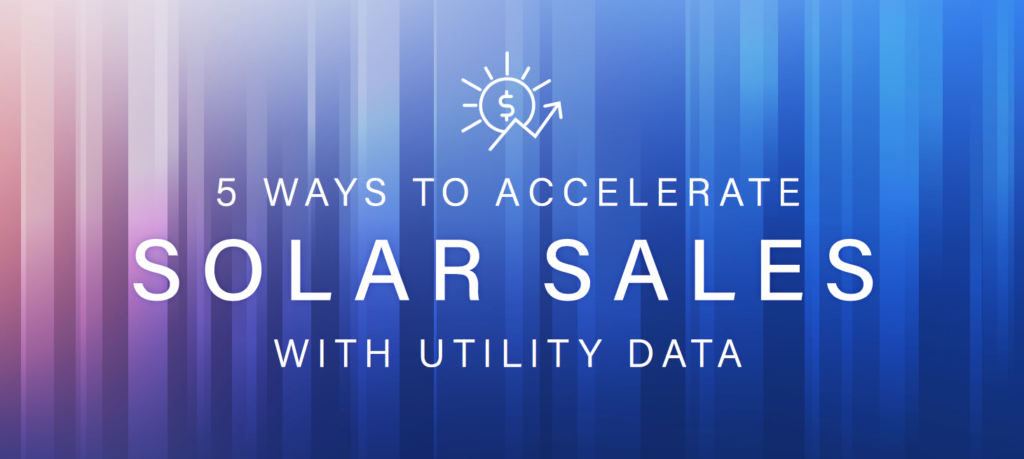
Achieving Net Profit Without Net Metering
Amy Hou | September 11, 2018 | Energy & Sustainability
A South Carolina net metering program that’s helped propel the state’s solar industry to the cutting edge is reaching its cap – and some 3,000 solar jobs are potentially at stake. What is net metering, how does it benefit the solar sales cycle, and – with net metering seemingly fated to be scaled back in the state – how will new solar customers in South Carolina find value?
Net metering boosts the value for solar prospects
The Solar Energy Industries Association (SEIA) defines net metering as “a billing mechanism that credits solar energy system owners for the electricity they add to the grid.” In other words, net metering allows solar system owners to sell the excess energy that their solar panels generate back to electricity providers.
Net metering programs have proven fruitful for the nascent solar economy. In 2014, South Carolina passed the Distributed Energy Resource Program Act, which established net metering and enacted a handful of other provisions aimed at incentivizing homeowners to go solar. In the four years since, South Carolina’s solar grid capacity has grown from 535 homes to an estimated 97,000.
This growth isn’t surprising: net metering significantly improves the value prop for solar. By offering customers the potential to generate and sell back their own energy to the grid, not only do solar installers offer a way to offset the cost of solar panels – they also give customers the chance to make more profit after the panels are paid off.
Utilities take on net metering
It’s also not surprising, then, that traditional electric utilities have fought tooth and nail to cap net metering programs or end them outright. To quote New York Times author Hiroko Tabuchi: “Utilities argue that net metering, in place in over 40 states, turns many homeowners into free riders on the grid, giving them an unfair advantage over customers who do not want or cannot afford solar panels. The utilities say that means fewer ratepayers cover the huge costs of traditional power generation.” Utility lobbies position themselves differently: according to Jeffrey Ostermayer of Edison Electric Group, the nation’s foremost electric utility lobbying group, their goal is simply to “balance the needs of all customers.”
Pictured: Department of Energy chief of staff, and former electric utility lobby executive, Brian McCormack
Utility lobbyists’ resistance to net metering and other solar incentive programs has had a clear impact on the industry. Last year, Hawaii, Indiana, Arizona, and Maine all voted to phase out their net metering programs. Hawaii’s solar industry is already feeling the resulting financial squeeze as revenue falls. South Carolina’s net metering caps may have a similarly chilling effect on that state’s solar revenue, and could spell trouble for the 3,000 solar jobs the state has added in the past four years.
So: what’s South Carolina’s solar industry to do? To keep the jobs the industry has added and keep it competitive and expanding, solar installers will need a new way to drive revenue and accelerate the solar sales cycle. At Urjanet, we’re confident that leveraging automated utility data can be a part of the solution.
Utility data for the solar sales cycle
With net metering seemingly on its way out across much of the U.S., solar providers need all the help they can get to drive revenue. Utility data can help in a variety of ways. For instance, with up-to-date utility tariff information on individual leads, solar installers can direct their sales efforts toward the customers with the sharpest increases in utility rates. Likewise, with seasonal and time-of-use information on prospective customers, installers can calculate a prospect’s potential savings down to the minute, helping them create credible, personalized proposals.
And that’s just the coating on the solar cell. Our infographic, 5 Ways to Accelerate Solar Sales with Utility Data, breaks down even more key ways utility data from Urjanet can drive more sales and keep solar installers competitive – with or without net metering.
Urjanet is the world’s leading provider of utility data for solar providers of all sizes. Check out the above infographic to learn more. And if you’re ready to see what Urjanet can do for your business, speak with an expert today.
You might also be interested in:
- Shedding Light on Solar: How Utility Data Drives Revenue Growth
- Will California’s Solar Mandate Pay Off for Homeowners?
- US Energy: Strategies for Weathering the New Tariffs
If you like what you’re reading, why not subscribe?
About Amy Hou
Amy Hou is a Marketing Manager at Urjanet, overseeing content and communications. She enjoys writing about the latest industry updates in sustainability, energy efficiency, and data innovation.
You May Also Like
Support Business Continuity by Embracing ESG
Honor Donnie | March 18, 2022 | Energy & Sustainability



